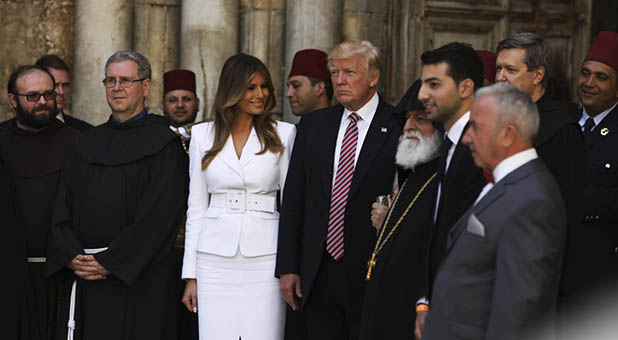Is President Trump on a Christian Pilgrimage?
While much has been made of the fact that President Donald Trump is the first sitting U.S. president to visit the Western Wall, Judaism’s holiest accessible site, little media attention has been given to President Trump’s visit to one of Christianity’s holiest sites: the Church of the Holy Sepulchre, the site of our Lord’s crucifixion, burial and resurrection.
President Trump’s visit to the Church of the Holy Sepulchre is also the first visit by a sitting U.S. president to that holy site, but because it does not offer the establishment media an opportunity to promote the pro-Palestinian narrative that Israel “occupies” East Jerusalem and the West Bank, the establishment media largely ignored it.
However, the president’s visit to this Christian holy site was in many ways a more powerful symbol than his visit to the Western Wall of Judaism’s Temple Mount.
In the 11th and 12th centuries, and throughout medieval times, the Holy Sepulchre in Jerusalem was the spiritual focus of Christendom and its most important pilgrimage center. Recapturing it from Muslim invaders and making it accessible to Christian pilgrims was the stated reason for the Crusades.
For many American Christians, keeping faith with the ancient Christian communities that have stood watch over the church for two millennia is no less important now than it was then.
According to Catholic News Service, over a half-million Iraqi Christian and other religious minorities have fled persecution at the hands of the Islamic State and the sectarian violence it unleashed on Mosul and the Ninevah Plain.
A month ago, ISIS suicide bombings of two Egyptian churches killed 47 worshippers, and those were only two of the most recent examples of the deadly assaults perpetrated against Christians in the Near East.
Vernon Brewer, the founder and president of World Help, in an analysis of a report issued by Open Doors, and released this past January, says 2016 was the “worst year yet” for Christians in the past quarter-century. According to the report, persecution of Christians has risen worldwide for three years in a row.
The report says Islamic extremism remains the global dominant driver of persecution, responsible for initiating oppression and conflict in 35 out of the 50 countries on the 2017 list.
The Center for the Study of Global Christianity, an academic research center that monitors worldwide demographic trends in Christianity, estimates that between the years 2005 and 2015, 900,000 Christians were martyred—an average of 90,000 Christians each year.
And we know the names of many of these martyrs.
A report submitted to the State Department a little over a year ago documented that between 2003 and June 9, 2014, at least 1,131 Christians—identified by name and place of death—had been murdered by the radical Muslims that comprise the Islamic State.
In addition, at least 125 Christian churches had been attacked or destroyed by ISIS.
“Murder of Christians is commonplace” in Iraq, Syria and Libya, states the report. “Many have been killed in front of their own families.”
Patriarch Ignatius Ephrem Joseph III Younan, the Syriac Catholic Patriarch of Antioch, many of whose flock lived on the Ninevah plain or in Syria, reports that “500 people were killed by ISIS during its takeover of Mosul and the surrounding region.”
“In Syria, where the organization Aid to the Church in Need has reported on mass graves of Christians, Patriarch Younan estimates the number of Christians ‘targeted and killed by Islamic bands’ at more than 1,000,” states the report.
According to the New Testament, Jesus was crucified at Golgotha, “the place of the skull” (Matt. 27:33–35; Mark 15:22–25; John 19:17–24) and died there (John 19:29-30) his burial place nearby (Mark 15:46-47) was also the site of his resurrection (Mark 16:5-7, Luke 24:1-12, John 20:16-18).
From its founding in the time of Constantine, Rome’s first Christian emperor, to the present, the Church of the Holy Sepulchre has been destroyed or damaged by earthquakes and invading Persian and Muslim armies, but it has always been rebuilt.
The medieval church was laid out to enable pilgrims to move from chapel to chapel, visiting the locations of Christ’s crucifixion and burial, their visit culminating in the location of Christ’s resurrection, the Holy Sepulchre itself. Much of that medieval fabric remains.
In ancient times, at Golgotha, to mark the completion of their pilgrimage, pilgrims would leave the crosses they had carried on the journey, and a great pile of these would be burnt on Easter Eve.
Today, with Christians around the world under attack as never before, and some of Christianity’s most ancient congregations in danger of extinction, we hope President Trump’s visit to the Church of the Holy Sepulchre will rekindle that ancient fire and renew American commitment to protecting persecuted Christians.
George Rasley is editor of Richard Viguerie’s ConservativeHQ.com.
This article was originally published at ConservativeHQ.com. Used with permission.
















































